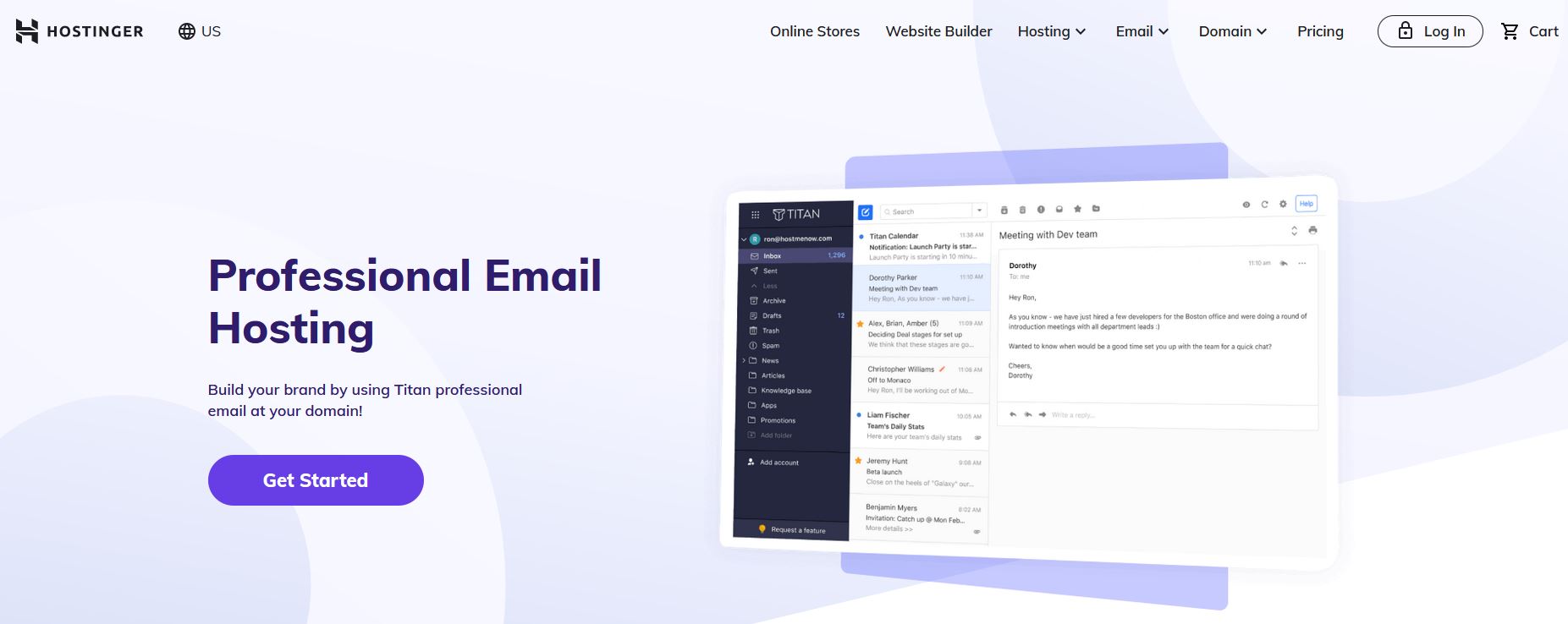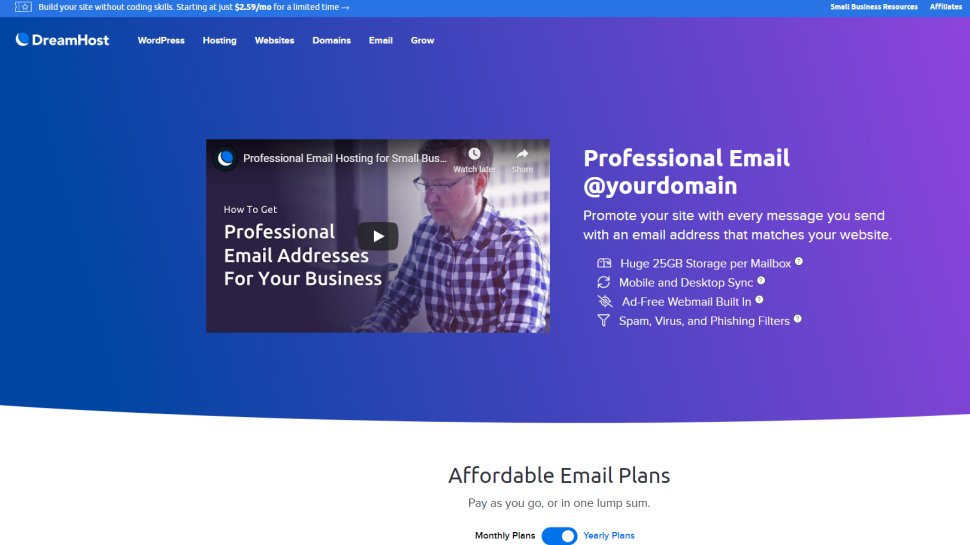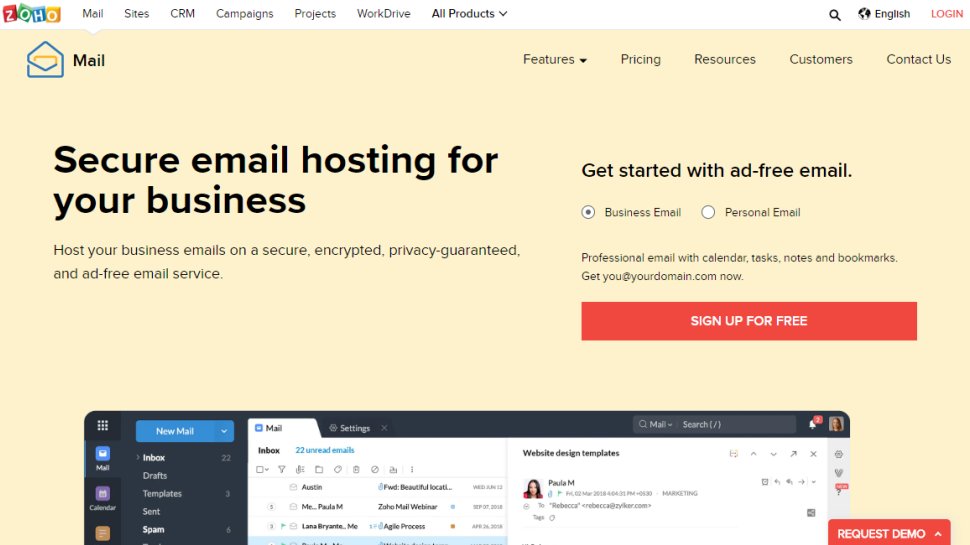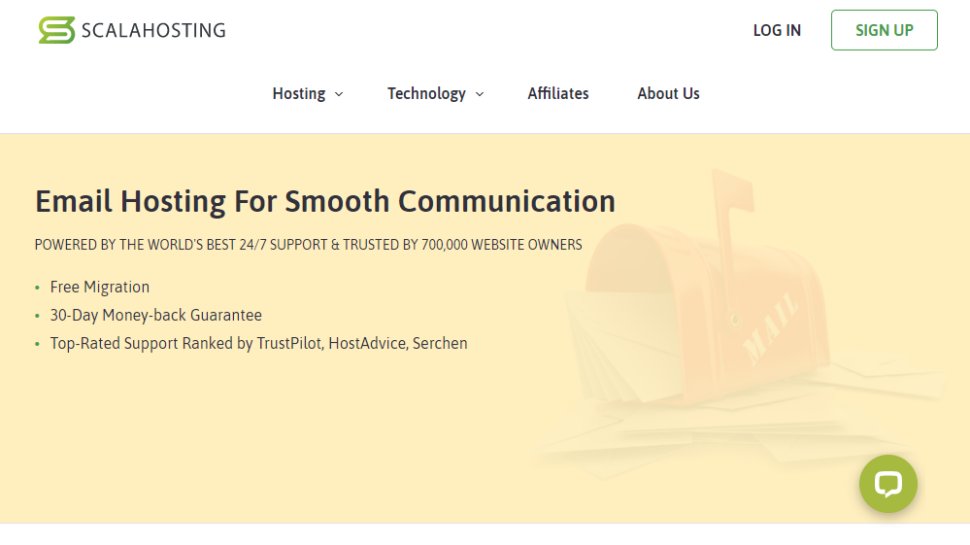Email hosting is much like web hosting services. Getting hold of an email account is easy – sign up with an ISP, register with Google, buy a web hosting account – but free and standard packages won't always deliver the quality that professional users need.
Email hosting plans are an easy way to get a more efficient and reliable service. Exactly what's included depends on the provider, but you might get support for larger attachments (up to 50MB), 50GB or more storage space for your inbox, online storage for easy file sharing, bundled apps like Microsoft Office online, Exchange and Active Directory support for business users – not to mention 24/7 support if anything goes wrong.
Your email will work with a custom domain (address@yoursite.com), and it's typically straightforward to set up. You can use an email hosting plan to effectively replace your web host's service, or you can try one without having any hosting at all.
With quality services priced under $1 per month per user, and free trials available, it's easy for anyone to check out the email hosting market. Whether you're after an individual account or would like to cover your entire business, we’ve provided detailed summaries of five of the best email providers on the market as of June 2021, that you might want to check out first.

If you are a small business with a small headcount and don’t want to spend hundreds of dollars on email accounts, then consider this. From EIG-owned Bluehost comes an exclusive business email package for TechRadar readers where you get unlimited email accounts and email storage for as little as $2.75 when paying for three years; that’s a mere $99 for the duration of the term. Is it truly unlimited though?
Bluehost says that they do not enforce any official limitations. Furthermore, they add “while email account creation is unlimited, these rely on the file storage available on the account. Therefore customers need to be operating within the Terms of Service to ensure resources are available to fully enable email functionality. Customers operating within the Terms of Service have yet to come up against technical boundaries for email, domains, or websites”.
What’s the catch then? For a start, while you get POP3 and IMAP4 plus 24/7 support, this is more of a barebone solution. You get to choose between three webmail applications (the equivalent of Outlook.com or Gmail.com); Horde, Roundcube or Squirrelmail.
You can of course configure an email client like Mail for Windows 10 or Mozilla Thunderbird to read your emails offline. Creating a new email address is a doddle thanks to an easy user interface.

Hostinger offers email hosting with a difference, offering the easy-to-use Flockmail interface to make it easy to use, send, and search your emails. This also includes a calendar app to make it easy to organize and set schedules, and the whole interface is mobile friendly.
Additionally, there is also video integration available for conferencing, which makes it especially useful for business use.
There are two main plans available, both of which come with up to 50 email aliases, antivirus checking, and multi-device support.
The Business email hosting plan offers 10GB of storage, 2 mail filters for just $0.99 a month per mailbox. The Enterprise email hosting plan increases these limits to 30GB of storage and unlimited mail filters, for just $2.49 a month.
All in all, the Hostinger email hosting plan offers simplicity yet usability for a very affordable price.

Dreamhost offers standalone email hosting among the range of different packages that this established web hosting services provider offers.
Dreamhost's email hosting offers 25GB of storage by default, with the ability to sync emails between desktop and mobile devices. Additionally, there's an ad-free webmail software platform included.
Another key feature is a smart anti-spam filter, which ensures the filtering of spam messages, but also viruses, malware, and phishing attacks. The filter is adaptive to emerging threats, ensuring that you remain protected.
There are a couple of key advantages in having your own hosted email account. The first is that it remains connected to your company domain name, which looks far more professional than a free email account.
Additionally, it also means you have complete control over your own data, and that your emails won't be automatically scanned to provide advertising at you, something free email providers do all too commonly.
Pricing is relatively inexpensive, and depends on whether you wish to pay on a monthly basis or commit to annual payments. Monthly plans cost just $1.99 a month, while a yearly commitment reduces this to the equivalent of $1.67 a month.

Zoho Mail is a hosted email service with a bundled online office suite, and a stack of other extras. Several of the newest features Zoho Mail introduced, are: Offline Mode, undo mail, recall mail, huge attachments (up to 250MB), audio/video calls, and a few others. Zoho Mail also has an IMAP client, so you can configure, sync, and manage your other email accounts via IMAP.
A free plan gives you five mailboxes with up to 5GB per user, a 25MB attachment limit and webmail access. A referral scheme could get you support for a further 25 mailboxes (at the time of writing the referral program wasn't available due to remodeling).
If that's too basic, the Standard plan gets you IMAP and POP support, 500MB attachments and 30GB of storage, 5GB file storage space, and support for working with multiple domains. That's more capable than some of the premium competition, and includes the same productivity tools as the free suite, yet still only costs $3 per user per month, billed annually.
Zoho's Professional plan gets you 100GB of storage (per user), 1GB attachments, support for Active Directory groups, and more. It's yours for $6 per user per month (billed annually), not bad at all for the storage space and features you're getting. Also, Lite plan is available with less features, but it's only $1 per user per month, billed annually.

Scala Hosting offers a range of different business email hosting plans that offer generous storage allowances that few competitors aim to match. Additionally, there are also a number of useful security features for business email users.
For a start there's a spam blocker that is advertised as being able to block 99.98% of spam emails. There's also protection against brute force attacks to protect you from malicious activity. The email server also uses SSL protocols to encrypt your emails for added security.
The email interface itself is web-based, so you can access it easily from both your desktop and mobile devices.
Four email hosting plans are advertised, providing anywhere between 50GB to 150GB of storage, between 10 and unlimited email boxes, and between 1 and unlimited email domains. All plans include spam protection and POP3/IMAP/SMTP.
Pricing starts at $2.95 a month, with the most expensive plan being $9.95 a month. However, these are introductory pricing offers, with renewals beginning from $3.95 to $19.95 respectively.
Overall, Scala Hosting offers a more serious business email hosting range of plans than many competitors, and the generous storage makes this one worth looking at.

10 things to look for in your next email hosting
If you want to host email accounts together with your website, then you should look at these email features before signup.
Most hosting companies will offer the ability to host your own email (something like email@yourdomain. com). Your package will include a number of email accounts – usually between 1-10 for basic hosting.
You’ll be given access to your own email control panel to set up your accounts. Using email requires two things: an email server and an email application, this could be an email client such as Outlook, or alternatively access to Webmail like Gmail or Yahoo.
The email server is a piece of software that runs on the server and is constantly connected to the internet. It receives and processes any mail sent to it and sends out any mail you send.
The email client is an app that runs on your PC, phone or tablet and enables you to send, receive and organise your emails, e.g. Microsoft Outlook. The client checks the mail server for messages and downloads them for viewing. It is a control panel for reading and writing messages.
The good news is that most email clients can connect with most email servers, you can even connect multiple email servers to work with multiple email accounts.
So your work and personal emails can be accessed from the same email client. The more popular email clients such as Outlook give you more features (calendars, tasks etc.) than using webmail.
Webmail is a web-based email interface that can be accessed in a web browser is often faster and more convenient because it accesses the stored data more directly without the user having to download software locally.
Emails can be checked from any device with access to the internet. Email protocols are a set of rules that help the client to send the information to or from the mail server. Two of the most common email protocols are POP and IMAP:
1. POP (Post office protocol) Applications like Outlook will use POP to download emails from the server to your computer and then delete them on the server.
2. IMAP (Internet message access protocol) IMAP is more advanced than POP, with IMAP, emails are stored in the mail server and can be accessed from any clients anywhere if they all use IMAP.
Mail data is kept on the server as well as your computer, until you delete the mail. When comparing hosting packages, be sure to choose one with full IMAP support.
Exchange Exchange is the gold standard email protocol – the most expensive option of the three, but for good reason. It’s a Microsoft protocol that gives you the power to sync tasks like IMAP does, but with the added ability to share contacts and calendars among employees.
If you can afford to pay the extra cost (around $9.99 per month per mailbox), you will reap the benefits of its advanced functionality and tools which can be used even when you are on the move.
You might also want to check out our other website hosting buying guides:
- Best WordPress hosting providers
- Best cloud hosting providers
- Best Linux web hosting services
- Best e-commerce hosting
- Best dedicated server hosting
- Best small business web hosting
- Best Windows hosting services
- Best managed web hosting
- Best business web hosting
- Best colocation hosting
- Best web hosting resellers
- Best VPS hosting providers
- Best shared web hosting
- Best cheap web hosting
- Best website builder
from TechRadar - All the latest technology news https://ift.tt/3jR9mMp
